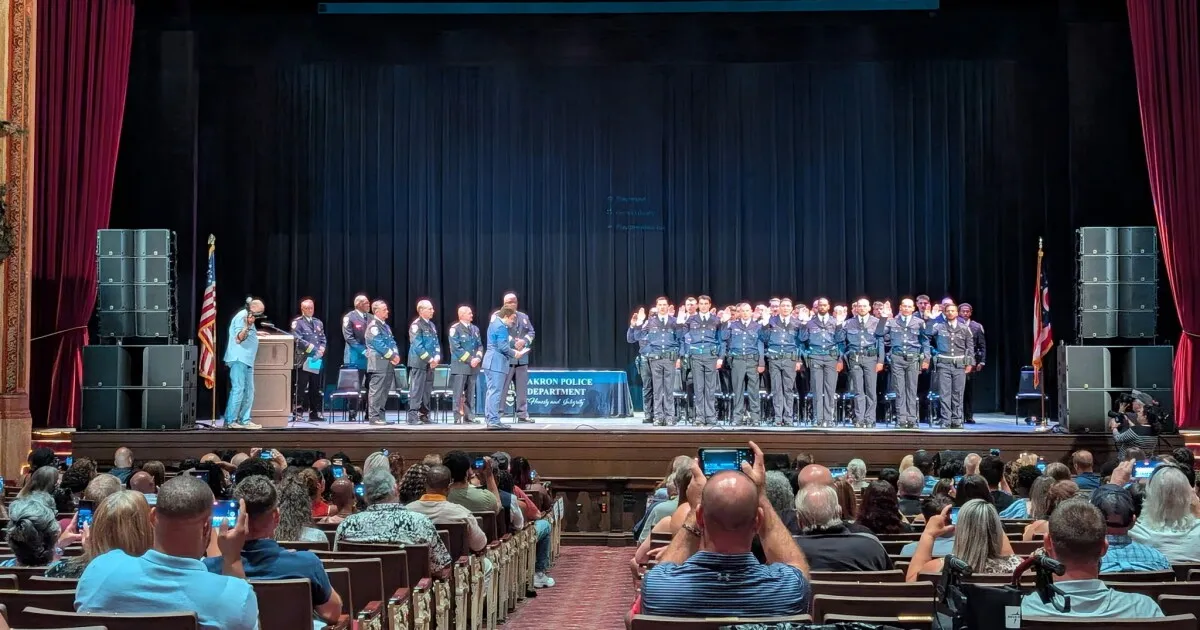In the luxurious hall of Akron’s Municipal Theater, where applause and whispers of hope echo, 29 new Akron police officers took the oath, marking not just a graduation from academy but a fragile step forward in addressing the chronic staffing shortage in American law enforcement. This ceremony, held on Friday morning, served as a testament to resilience in times when the police profession is increasingly associated with risk and societal skepticism.
Among the recruits is Tatyana Cooper, 29, a native of Milwaukee, Wisconsin, the oldest of 15 children in a large family. Her path to badge is a classic example of how a calling can transform a life: from preschool teacher to street defender. “It definitely pushes me out of my comfort zone, but I knew this is what I wanted to do, I committed to it, and here I am,” Cooper said, her voice filled with quiet determination reminiscent of the thousands of women entering a profession traditionally dominated by men. In the context of reforms following the 2022 Gilenda Walker shooting in Akron, where the department faced allegations of racism and excessive force, stories like Cooper’s serve as a powerful counterargument to skeptics, demonstrating efforts to diversify personnel.
No less compelling is the story of Lyman Carter III, a 34-year-old army veteran who worked in banking and retail, and is now coaching youth in Akron’s youth soccer league. His father, Lyman Carter Jr., pinned a badge on his son’s uniform amid loud applause — a moment symbolizing generational continuity in service. “What they see when I walk on stage — my mom, my dad, my brothers and sisters, my family — means everything to me,” Carter III shared. His motivation stems from a desire to create a positive image of police for youth, especially in communities where trust in law enforcement has been undermined. As an insider who has spoken with numerous officers nationwide, I can confirm: initiatives like engaging veterans and coaches are part of department strategies to combat the 27-60% drop in recruitment caused by the pandemic, social protests, and rising violence.
The ceremony, led by Mayor Shamas Malik, reminded attendees of the tough realities of the profession. Police Chief Brian Harding warned the recruits: “You will face difficult situations, moments that will test your resolve, patience, and judgment.” These words gained particular significance in light of recent attacks on officers in Northeast Ohio. Just hours before the ceremony, two officers from East Cleveland were shot, resulting in the arrest of a suspect after a night chase. In July, three officers from Lorain were ambushed; one, Philip Wagner, was killed, and the shooter, Michael Parker, was neutralized in response. These incidents are part of a disturbing trend: according to CBS News, at least 50 officers have been affected by ambushes this year, highlighting the increasing danger of the profession and complicating recruitment efforts.
Despite this, recruits like Carter III remain unwavering. “Of course, I sympathize with these officers. It’s unfortunate, but that’s why I decided to wear this uniform — to go out into the streets with my brothers, sisters, and friends and protect this community,” he said. Some will be patrolling as early as Sunday, joining a department that, according to Mayor Malik, continuously works on staffing and recruitment. Akron plans to open another academy course by the end of the year, building on the success of previous years — over 1,000 applications in 2023 — despite the overall crisis, with departments across the country implementing procedural changes to counter low morale and shortages.
In times when policing faces challenges from public criticism to physical threats, these 29 officers embody hope for transformation. Their stories are not just anecdotes but proof that, despite everything, the calling to serve remains powerful. As Akron’s reforms, including civilian oversight and a focus on public trust, show, the path to justice requires not only badges but also resilience of spirit.


